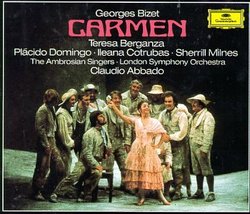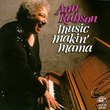| All Artists: Teresa Berganza, Plácido Domingo, Ileana Cotrubas, Sherrill Milnes, Richard Amner, Robert Lloyd, Yvonne Kenny Title: Bizet - Carmen / Berganza, Domingo, Cotrubas, Milnes, Abbado Members Wishing: 1 Total Copies: 0 Label: Deutsche Grammophon Release Date: 10/25/1990 Album Type: Box set, Import Genre: Classical Style: Opera & Classical Vocal Number of Discs: 3 SwapaCD Credits: 3 Other Editions: Bizet: Carmen, Bizet: Carmen UPC: 028941963628 |
Search - Teresa Berganza, Plácido Domingo, Ileana Cotrubas :: Bizet - Carmen / Berganza, Domingo, Cotrubas, Milnes, Abbado
 | Teresa Berganza, Plácido Domingo, Ileana Cotrubas Bizet - Carmen / Berganza, Domingo, Cotrubas, Milnes, Abbado Genre: Classical
This is a super performance, slightly outside the common mold. In 1977, when this was recorded, Claudio Abbado was a great opera conductor, filled with sharp insights and a nice sense of the architecture of whole operas. H... more » |
Larger Image |
CD DetailsSynopsis
Amazon.com This is a super performance, slightly outside the common mold. In 1977, when this was recorded, Claudio Abbado was a great opera conductor, filled with sharp insights and a nice sense of the architecture of whole operas. He always seemed to know where he was going, and his ability to build to climaxes was second to none. Abbado has a rather elegant Carmen here in the smallish-voiced, introspective Teresa Berganza, a gorgeous singer who patently refuses to force her voice or her character into vulgarity. It's a fine reading. Placido Domingo is at his best in both intimate and maniacal moments, and Ileana Cotrubas's Micaela almost makes us care about this sappy little gal. Sherrill Milnes's Escamillo has plenty of swagger and voice. Berganza's subtlety combined with the wild passions of those around her make this a very good Carmen indeed. --Robert Levine Similarly Requested CDs
|
CD ReviewsLIKE HEARING "CARMEN" FOR THE FIRST TIME! 03/14/2004 (5 out of 5 stars) "I stopped listening to "Carmen" years and years ago because I was, quite frankly, totally sick of it. Owning the famous recordings by Rise Stevens, Solange Michel, Leontyne Price, Maria Callas, Titiana Troyanos, etc, I gave most of them away, keeping only the wonderful de los Angeles EMI version (now available on EMI's Great Recordings of the Century). I was perfectly content to live with this single recording. I mean - after forty years of opera going and record buying, what could "Carmen" ever do for ME? Nothing, I thought, and I just left it alone. I received this recording of "Carmen" for my birthday, and reluctantly, I opened it and put it on. I was immediately stunned by Abado's tempi and the sheer sound of the orchestra. The French dialogue was crisp and peppy, and the choral work was stunning. Placido Domingo's Don Jose was known to me, as I heard him do the role with Lyric Opera of Chicago years ago, but I didn't remember him sounding quite this wonderful. His Flower Song would melt a stone, and his singing throughout is sympathetic and very moving. Sherrill Milnes does not really have a very big role here -- he sings his Torreador Song well, and sings with sufficient ardor to arouse Carmen, which is basically what he's there for. Micaela is sensitively sung by Cotrubas, and she blends beautifully with Domingo in their first act duet ---- also, she sounds genuinely terrified in her third act aria. Now to the sublime Teresa Berganza. Quite plainly, I have never heard the role of Carmen sung so beautifully. The sheer sound of Berganza's magnificent voice is truly something to experience. It cannot be described. She is a patrician Carmen ----eschewing all of the traditional gypsy spitfire teeth gnashing -- and creating a beautiful portrait of a free spirit whose voice is as beautiful as she is. No Carmen I have ever heard --- the great Victoria de los Angeles included -- has ever sounded like this. Berganza is a great artist, and not even her beautiful work in Rossini and Mozart prepared me for the sheer beauty of her Carmen. Aided and supported by Abbado, who shapes the score in a completely new way, Berganza has made me completely re-evaluate this opera ---- and that is no small feat. This is a recording to own, cherish, and play --- over and over again. It's a jewel of a recording." Exquisite recording of *CARMEN* Isabella Channel | 03/07/2000 (5 out of 5 stars) "I agree with those who love this recording. Those few who don't, I can't understand. La Berganza sings a ravishingly beautiful Carmen and certainly no one does it better. Not Callas, not Price, not Baltsa and certainly not Resnik. Domingo as Don Jose is outstanding, and Abbado conducts with white-hot passion. This recording made in 1977 has aged extremely well, the sound is far better than the cavernous Karajan set." A well done "Carmen" from the 1977 Edinburgh Festival (but a Craig Matteson | Ann Arbor, MI | 09/19/2005 (5 out of 5 stars) ""Carmen" has become one of the most popular operas in the repertoire since its premier in Paris in 1875. It was received coolly at first, but Bizet had received a nice payment for the publishing rights and it received 37 performances (the composer, however, died after the 31st performance at 36 years old). This opera has an interesting performance history as well as a very unusual plot and musical treatment.
First of all, do not be deceived by its classification as opera comique. This is a stylistic category because there is some spoken dialogue rather than using recitative. However, for performances outside France, it was supplied with recitative (not by Bizet, because he had died). This performance uses a "restored" score and does not use recitative for those passages. How should the role of Carmen be played? First, think about whom she is playing against. The male protagonist, Don Jose, is not a hero. Once he becomes enflamed by Carmen, he spirals into worse and worse behavior. These two never become of one heart or even genuinely in love. This is not a traditional love story. There are no heroes or even a clearly defined bad guy. Well, Don Jose is a bad guy, but he is also the male lead and doesn't really fill the role of a villain in the traditional sense. The issue for playing Carmen is what kind of gypsy do you believe her to be? She is certainly flirtatious, fierce, and will not be possessed. Nowadays, we tend to admire her fierce independence rather than being shocked by it. Her casualness towards love and sex can still shock and trouble those who believe in more traditional values. Still, this Carmen, Teresa Berganza, sees a certain dignity and propriety in her and plays her with a national pride. She is Spanish and refused to play Carmen as a French caricature of a Spanish gypsy. This is not how Carmen is often seen. It is easier to excite the audience with a more erotic (lurid) performance. The singing here is very fine with Berganza as Carmen, Placido Domingo as Don Jose, and Sherrill Milnes as Escamillo. This recording was made after this cast (largely) performed the opera as part of the 1977 Edinburgh Festival. It sounds great. The notes are helpful and the libretto is provided in the original French with an English translation by its side. This is Bizet's masterpiece, has many familiar tunes, and much other fine music. "Carmen" is an opera that anyone can enjoy and for a variety of good reasons." |

 Track Listings (19) - Disc #1
Track Listings (19) - Disc #1








